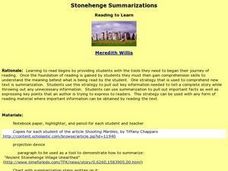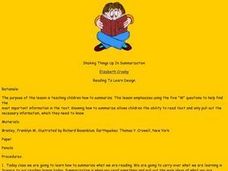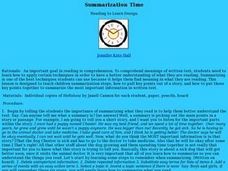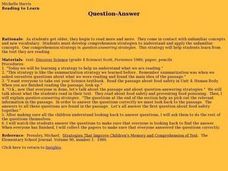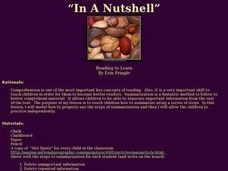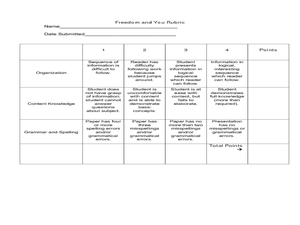Scholastic
Summarizing: Using Hand Motions for Key Words or Points
Learning to summarize texts takes practice. Jump into the training ring and guide your learners through a summarizing practice session. The classic direct instructional practice of "I do, you do, we do" is used to help them identify key...
Curated OER
Let's Get it Together! Reading to Learn
Let’s learn about frogs! Young readers are led through “Freaky Frogs,” a non-fiction article. Teach learners how to edit an article so there are fewer details to sift through. After talking through the article, they learn the six steps...
Curated OER
Summarizing Key Information
Imagine the surprise when small groups present their Evidence Charts to the class and discover that each group has studied a different version of the Cinderella story. Irish, Ojibwa, Egyptian, Chinese, Korean, Persian, Mexican, and...
Curated OER
Stonehenge Summarizations
Students encounter the tools they need to begin their journey of reading. They must realize that they must gain comprehension skills to comprehend the meaning behind what is being read. Students use this strategy to pull out key...
Curated OER
Summarization Made Easy
Students explore the concept of summarization. They discuss the importance of summarization and the steps to summarize a text. Students read a text and highlight the important or main ideas within the text. They discuss the information...
Curated OER
Mapping Out Summarization
Young scholars summarize a selected piece of text using a a six step process. After reviewing the correct way to read silently, students read a selected piece of nonfiction text. They write a summary paragraph using the six step...
Curated OER
Shaking Things Up In Summarization
Students practice several techniques and strategies to become better at summarizing a piece of writing. They emphasize the five "W's: who, what, where, when and why. A book of Earthquakes is read and then summarized by each of the students.
Curated OER
Retelling Information
This scripted instructional activity suggests using the journalist’s five W’s (who, what, when, where, why) to teach readers how to summarize a story and to how to distinguish between significant and supporting details. A template and...
Curated OER
The Bear Facts About Summarization
Students practice summarizing techniques in this lesson. They listen as the teacher reads from a non-fiction article, and the class creates a story map to highlight the most important facts from the article. They use the map to write a...
Curated OER
Summarization Time
Students write summaries in this lesson. They read "Stellaluna" by Jaell Cannon independently and answer story map questions: who, what, when, where, and why. They then take the answers to these questions and write an individual summary.
Curated OER
Ten Cents a Word
Students recognize the importance of summarizing in this activity. They "sum up" an article about monarch butterflies. Students practice writing summaries of the article charging themselves 10 cents/word. They try to write the least...
Curated OER
Five Step Summary
Students review the five steps to summarization. They then read the article "Whoooo-o Are You?" silently. As a class they summarize a small section of the article using the five steps included. Finally, the students summarize...
Curated OER
The Long and Short of It: Summarizing Important Details
Students practice their summarizing skills while listening to a brief biography of Amelia Earhart. Students take notes while the teacher reads the article and write a paragraph that summarizes the important events from Amelia Earhart's...
Pennsylvania Department of Education
Using Literary Elements to Compare Fiction Texts
Pupils explore language arts by reading and reflecting on literary examples. In this fiction writing lesson, students read several different cultural versions of the story "Cinderella" and discuss their interaction with the story and...
Curated OER
Question - Answer
Learners use the comprehension strategy question-answer to improve reading comprehension. They read a passage out of their textbook, and the teacher models the question/answer strategy by asking about key points mentioned in the reading.
Curated OER
In a Nutshell
Students summarize a non-fiction article in this lesson. They review a six step process for summarization. They then read the assigned article, and work as a class to write a summary using the five steps provided. They then write an...
Curriculum Corner
ELA Common Core Checklists for K-6
In the hustle and bustle of life in the classroom, it's easy for teachers to lose track of the standards they have taught, and those that still need to be addressed. This Common Core checklist provides educators with an easy-to-use...
Curated OER
Robert Smalls: Warrior and Peacemaker
Pupils research the events that led to the Civil War and the Reconstruction. In this Civil War history instructional activity, students study images of Robert Smalls and research his role in the Civil War. Pupils review the South...
Curated OER
Freedom and You
Students research the American Revolution. In this Revolutionary War lesson, students research facts about the American Revolution, write an expository essay, and peer edit for good content. The paper is suggested to be written after...
Curated OER
Same, But Different
Students compare and contrast specific characters in the book, "Old Henry." They discuss similarities and differences between people and define character traits. They assess one's own character traits and have a class discussion about...





